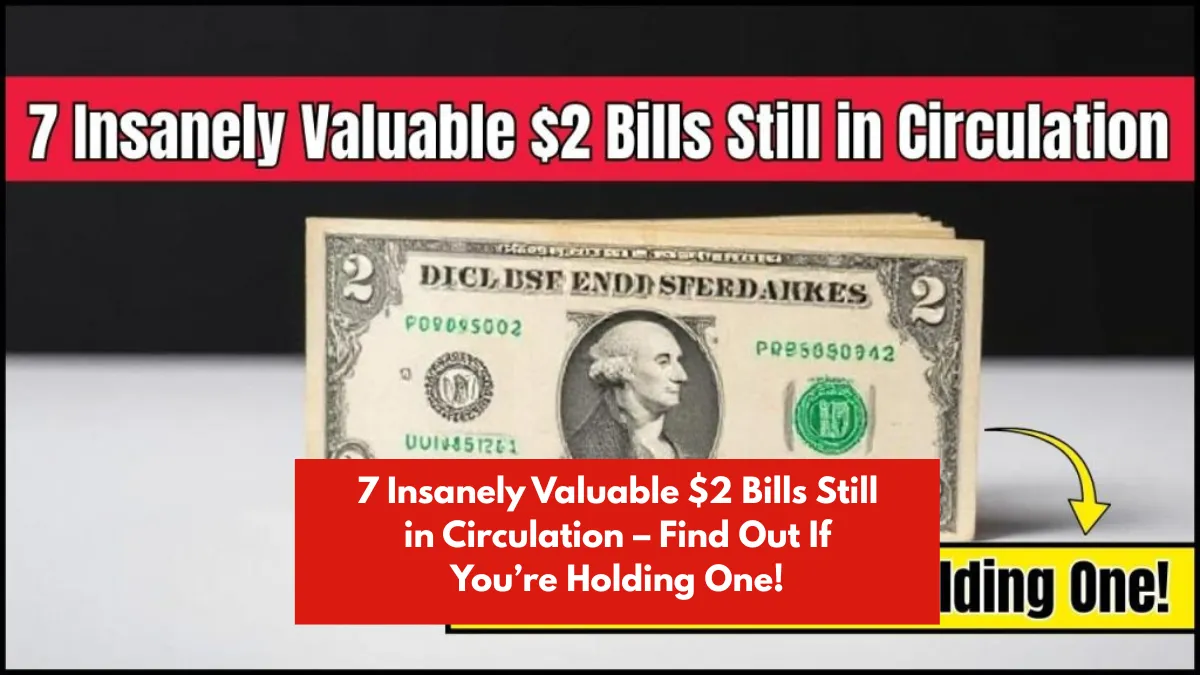7 Valuable $2 Bills Still in Circulation – Check Your Wallet!
Most people think the $2 bill is just a quirky piece of cash you rarely see. But what if we told you that some $2 bills could be worth hundreds or even thousands of dollars? It’s true—some $2 bills still being used today are considered collectibles because of their age, serial number, or condition.
Whether you’re just curious or already into collecting, knowing what to look for could help you find a hidden gem right in your wallet.
Why Some $2 Bills Are Worth a Lot
Even though most $2 bills are only worth $2, a few rare ones are worth much more. Collectors look for special features like:
- Old print dates (like 1890 or 1928)
- Unusual serial numbers (like 00000001 or 1234321)
- Star notes (used to replace misprinted bills)
- Bills in perfect condition (uncirculated or barely used)
These details can turn an ordinary $2 bill into a collector’s prize.
7 Valuable $2 Bills to Watch Out For
| Type of $2 Bill | Why It’s Valuable | Estimated Value |
|---|---|---|
| 1890 Treasury Note | Rare and beautifully engraved, features Gen. McPherson | Up to $4,500 (uncirculated) |
| 1928 Red Seal | First small-size $2 bill after redesign | $100–$1,000+ |
| 1953 & 1963 Red Seal | Common but collectible in excellent shape | $5–$25 (more if uncirculated) |
| 1976 Bicentennial Bill | Released for U.S. Bicentennial, some stamped with postmarks | $20–$900 |
| 1995 & 2003 Star Notes | Printed to replace damaged bills; marked with a star | Up to $1,000+ |
| 2003A Minneapolis Star Note | Printed in very small numbers | $800–$1,200 |
| Fancy Serial Numbers | Unique patterns like 12345678 or 00000001 | $100–$5,000+ |
How to Tell If Your $2 Bill Is Valuable
1. Check the Date and Series
Look in the bottom-right corner of the bill. Older bills—especially from before 1928—are usually worth more.
2. Look at the Color of the Treasury Seal
- Red seals = older and collectible
- Green seals = modern and usually face value
- Star symbols at the end of the serial number = limited edition replacements
3. Examine the Serial Number
Watch for:
- Low numbers (like 00000007)
- Repeaters (like 56565656)
- Palindromes (like 1234321)
- Binary numbers (just 0s and 1s)
- Star notes (end with a star)
4. Check the Condition
Bills in better shape are worth more. The best condition is uncirculated (no folds or damage). Even if your bill is rare, heavy wear lowers its value.
Where to Sell or Get an Appraisal
If you think you’ve found a valuable $2 bill, you can check its worth or sell it at:
- U.S. Currency Auctions
- Heritage Auctions
- eBay (search sold listings to see real sale prices)
- Coin shows or antique dealers
FAQs About $2 Bills
Q1: Are $2 bills still being made today?
Yes! The U.S. Bureau of Engraving and Printing still prints $2 bills in small quantities. They’re legal tender and totally usable.
Q2: How can I tell if a $2 bill is a “star note”?
Check the serial number. If there’s a small star symbol at the end instead of a letter, it’s a star note—these are more collectible.
Q3: Do fancy serial numbers always make a $2 bill valuable?
Not always, but unique numbers like 00000001, 12345678, or 88888888 can raise the value a lot—especially if the bill is in great shape.
Q4: Can I spend a rare $2 bill at a store?
Yes, you can use it anywhere that accepts U.S. currency. But if it’s rare or valuable, it’s better to sell it to a collector than to spend it.
